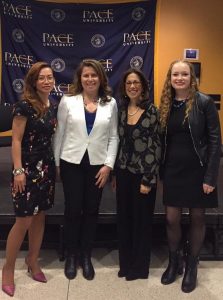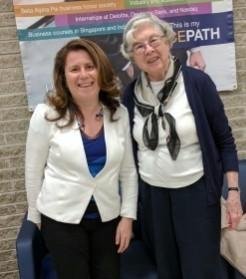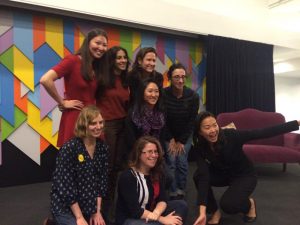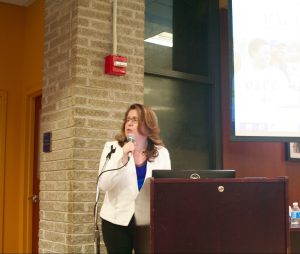Helen Altshuler is a Seidenberg alumna (BS in Computer Science ’97) of whom we are particularly proud. Not only does she have a fascinating life story, but years of hard work have enabled her to progress to a position of thought leader today. Recent articles have described her as one of the top female “engineering leaders closing the gender gap in NYC tech” (builtinnyc.com), despite her status as a noteworthy woman in tech being quite unintentional and unexpected on Helen’s part! She’s also a member of the Seidenberg Advisory Board, so we get to enjoy her presence frequently.
 As a senior engineering leader at Google, Helen is responsible for managing a multi-year transformation program in Google Cloud, and an Open Source platform called Bazel. Prior to Google, Helen was the CTO at the fintech startup PeerIQ, where she built data and engineering teams, created a cloud based analytics platform for peer to peer lending, and sold it to key institutional clients. She started her career as a software engineer at JP Morgan, after obtaining a CS degree at Pace University. She grew into technical leadership and Executive Director roles, becoming responsible for technology delivery in Credit Risk, Big Data and Analytics.
As a senior engineering leader at Google, Helen is responsible for managing a multi-year transformation program in Google Cloud, and an Open Source platform called Bazel. Prior to Google, Helen was the CTO at the fintech startup PeerIQ, where she built data and engineering teams, created a cloud based analytics platform for peer to peer lending, and sold it to key institutional clients. She started her career as a software engineer at JP Morgan, after obtaining a CS degree at Pace University. She grew into technical leadership and Executive Director roles, becoming responsible for technology delivery in Credit Risk, Big Data and Analytics.
Helen is passionate about talent development and is a frequent hackathon mentor/judge, women in tech guest speaker, and Girls Who Code facilitator. She actively promotes diversity and STEM initiatives at Pace University as a member of Pace Women in Business Steering Committee.
I visited Helen at Google the day after a snowstorm in NYC. When I emailed her to check we were still on, she responded that, yes, “the city is open and so are we” – my first glimpse of a woman with extraordinary work ethic.
Not long after we sat down, Helen began to describe her life. Born in the former Soviet Union (now Ukraine), Helen didn’t experience the same societal norms concerning gender as in the USA. “Women leaders were everywhere!” she said, listing the Russian astronaut Valentina Tereshkova, India’s first and only female prime minister Indira Gandhi, and British prime minister Margaret Thatcher.
She moved with her family to the United States following the collapse of the Soviet Union, where limited opportunities and discrimination caused them to come to America as refugees.
“I came here for the opportunities that weren’t available to me in my country – nothing was going to stop me from doing that,” Helen says. “I also came here as a woman, from somewhere where I wasn’t restricted by anything.”
One would expect that coming from a background of gender equality to a place where society treats the sexes with discrepancies ranging from subtle to outrageous would be quite the culture shock. However, Helen’s experience was different. Her background had escalated her to the point where her interactions with people were based on them as individual personalities. “I feel like I had blinders on; those blinders helped me. I never saw men and women at work – I saw people and colleagues who were there to work together.”
In fact, Helen never even thought of herself as a “woman in tech” until, 10 years into her tech career, she was invited to speak at a women in tech panel for the first time. Technology was just something she did, like everybody else she worked with. It was something she had always done.
“Since I was the only child, my father wanted to raise me to be as technical as I could be,” Helen explains. That said, when she first moved here she was interested in doing art but a swift reality check made her change her mind. “I walked down Broadway seeing artists selling their work for nothing and I couldn’t do that as an immigrant. I needed a make a living!”

She started the Bachelor of Science in Computer Science here at Pace University in 1993. This was around the time the world wide web was really becoming worldwide, and the internet was rolling out and developing faster than ever. What was it like being in the middle of that frenzy?
“Everything was moving so fast at that point that I didn’t have time to stop and think about it. I was an intern at Marsh & McLennan (insurance company) through Pace’s co-op program, and HTML and CGI had just become popular. My boss bought a book called HTML for Dummies and put it on my
desk and said ‘hey, we need an intranet site’ – it was a continuation from my studies at Pace. It was pretty organic; my job was all about building technology and this was a new thing to build.
“Pace had IRC chat before the world wide web. The amazing thing was that only the computer science students at other universities had access at the time. We had mainframes that allowed us to connect with CS students across the world; I chatted with students in Canada, Israel, Russia – it’s how I met my husband who was at Polytech. It brought us together through our curiosity about technology. It was a way to get perspective from different tech students. Later on, more students from other disciplines got on, but for a while it was just us tech students.”
After she graduated, Helen started out as a software engineer and grew her career from there. She learned that progress was good and that taking opportunities was a way to move on to bigger and better things. “But don’t move up so quickly that you have to play catch up for the rest of your career,” she warns. Even in her senior position now, Helen is an advocate of gaining and maintaining technical knowledge. It isn’t fun moving into a new position where you feel lacking in the knowledge department – in the long run, progressing too soon can hold you back.
One should never shy away from progress, on the other hand. Helen’s list of recommendations for corporate career growth is short and simple:
- Become a domain expert
- Align yourself to your manager’s success
- If you see an opportunity, raise your hand
- If you’re tapped on the shoulder, go for it
- … but resist the temptation to move up too quickly before building your domain expertise
But what if opportunities don’t seem to come your way? Women in particular can find it difficult to say yes to progress, even when offered to them – and when it’s not? Many struggle to start conversations and end up waiting for a promotion that either won’t come or comes much later than it should, whereas if they had asked for it they could have received it sooner.
“Sometimes women rely on their managers to appreciate them,” Helen says, echoing a sentiment expressed by another of our alumna, Kim Perdikou.
Kim, who graduated in 1993, said in a previous interview: “I had this very wrong belief that if you worked really hard your boss would recognize it and you’d eventually get a job doing what you really should be doing. That is utter rubbish.”
Interestingly, another Seidenberg friend who recently spoke at our LST Honoree Speaker Series (which Helen introduced), Judy Spitz, told a story about advancement as a woman: “Once, early in my career, I got called into the senior executive’s office and he said ‘I want to give you this job’. I said to him ‘I’m not sure that I’m qualified for that job’. He looked at me like I had three heads. I’m not sure he’d ever had anyone in that office he’d offered a promotion to who said no, thanks.”
Imposter syndrome and plain societal conditioning are big problems for many women in technology – and in other fields. As someone with experience having these conversations and self-advocating, Helen has some advice.
“Bring your data with you,” she says. Your manager can’t deny your good work if you bring along proof. “Sometimes, you need to put your foot forward, show your data, and negotiate.”
 Negotiating doesn’t have to be confrontational, either. “You don’t want to go too aggressive; it can affect your self-worth. When I came to Google, I took a leap of faith – I did not negotiate aggressively, because I looked at this opportunity as a longer term career path rather than just the next job.”
Negotiating doesn’t have to be confrontational, either. “You don’t want to go too aggressive; it can affect your self-worth. When I came to Google, I took a leap of faith – I did not negotiate aggressively, because I looked at this opportunity as a longer term career path rather than just the next job.”
The notion of women in technology being a movement and of being a woman in technology herself took a hold on Helen. It was also what spurred her interest in board memberships. When I asked her why she joined the Seidenberg advisory board, she replied that she’d always been curious about it.
“I attended a women’s leadership panel where they stressed the importance of being on boards. It’s important to establish yourself as a thought leader – that helps with a broader perspective and gets you recognized within your industry. Women on boards is kind of the same thing as women CEOs and other high positions – there just needs to be more of it!”
Being on the board means bringing unique ideas with her to the Seidenberg School. “I started teaching through my son’s school Girls Who Code program, and started thinking about when I first came to New York, wanting to be an artist. I want to create a web design & developmente program at Pace. There is a benefit to combining the arts and sciences school and the computer science school. There are coding boot camps for Web Design and Development, but they fall short in giving CS fundamentals, impacting the quality of front end engineers on the market. Pace is uniquely positioned to do it, with the perfect combination of art and computing.”
Working with Girls Who Code (GWC), a national not-for-profit organization that aims to close the gender gap in technology, has created a reciprocal relationship for Helen. She started working with GWC around the same time she started at Google – late summer, 2016. “That’s usually how it is for me: when you start something new, you try to put yourself on a path that’s going to change your life to some extent.”
Helen teaches web design and development, which was what inspired her thought process about potentially combining art and computing in a program at Pace. In fact, her participation with GWC, Seidenberg, and her work at Google are mutually beneficial: “The logical connection between Google, GWC, and Seidenberg, is that learning one helps the other. I had to re-learn some HTML and CSS for GWC, then one of the first things I had to do at Google was update a roadmap page on our website using those same skills.”
“Similarly, I bring suitable Google concepts, like material design and design sprints, to GWC and other programs. What I learn here, I apply in class, and what I learn in class I can sometimes apply at Google as well!”
 Despite having been with Google for less than a year, Helen has, as she put it, “drank the Kool-Aid.” The company’s focus on community meant a focus on integration at the beginning. “I learned that newcomers to Google get to wear a stylish hat complete with a propeller on top and are referred to as “Nooglers” for the first six months.”
Despite having been with Google for less than a year, Helen has, as she put it, “drank the Kool-Aid.” The company’s focus on community meant a focus on integration at the beginning. “I learned that newcomers to Google get to wear a stylish hat complete with a propeller on top and are referred to as “Nooglers” for the first six months.”
Working at the coveted Google company means Helen knows a thing or two about career paths. So what’s her best advice for tech students? And what about getting beyond the infamous Google interview?
“You need to build your domain expertise. In technology, that expertise manifests itself in two areas. One, which is the most important in interviews, is hardcore tech skills. You need to know your algorithms, etc, and it helps you do well in interviews. The second one is, I meet a lot of students who want to be managers. They should be more thoughtful about their longer-term career plans. You can’t manage until you understand your domain well. A lot of women are drawn to technical leadership – you need to be a domain expert first, which could take 4+ years of coding before you can move on.”
“Camille Fournier [a technical thought leader and former chief technology officer of Rent the Runway], said that she worked as a software engineer for 10 years and achieved mastery; at that point, she could apply herself to any technology, even if she was out of practice.
 “At Google, you are constantly pushed in technical directions. Even as a leader, I’m expected to code – and I welcome that extra reinforcement. On the other hand, where I achieved mastery is in systems design and scalability, and understanding how to process data and work with data at scale. That’s what Google is all about and that’s what you learn, and it’s also important in the fintech sector. You want to keep your systems working under different conditions. Those are the skills that help you get a job in any industry. No matter what systems you work on, they need to scale and they need to be reliable.
“At Google, you are constantly pushed in technical directions. Even as a leader, I’m expected to code – and I welcome that extra reinforcement. On the other hand, where I achieved mastery is in systems design and scalability, and understanding how to process data and work with data at scale. That’s what Google is all about and that’s what you learn, and it’s also important in the fintech sector. You want to keep your systems working under different conditions. Those are the skills that help you get a job in any industry. No matter what systems you work on, they need to scale and they need to be reliable.
“A lot of my interview at Google had to do with understanding of scaling large and complex systems. Google has billions of users; how do you keep that data usable? When you click on an email, how do you get it to load instantly instead of in 10 minutes? I may not achieve mastery on the pure coding front, but I certainly achieved it on systems design/scalability front.”
Having domain expertise is something that can only be achieved after years of practice. Anyone can get into casual coding, but it’s the hours you put in that really count. Helen is clearly someone who has put the hours in. “I try to tie in everything extracurricular that I do directly to work or to family,” she says. “I do hackathons with my son, coding camps with my daughter.”
And all of that is against the backdrop of NYC. “I can’t imagine living anywhere else. I like having lots of options to explore with my kids. When the kids were little, I took them to celebrate every international holiday – Chinatown for Chinese New Year, Little India for Independence Day, so we could celebrate international culture.”
Diversity is one of the things that makes New York great. It’s a city of hard workers, a landscape that is reflected within the walls of the Seidenberg School as students rush from class to internship to workshop to co-op job to networking event.
Recently, the New York Times ranked Pace University #2 nationwide for the upward mobility of our students. Students who come through our doors from less privileged backgrounds end up graduating and going on to great things. When Helen moved here in 1993 with $3000 to her name and the determination to make a good life for herself and family, she exemplified that quintessentially New York attitude – and ours.


